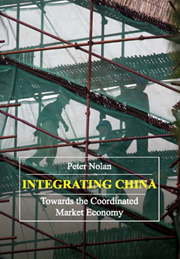Book contents
- Frontmatter
- Contents
- Acknowledgements
- Foreword
- 1 Reflections on 4th June 1989
- 2 The Global Business Revolution and Developing Countries
- 3 The Globalisation Challenge and the Catch-up of Developing Countries: The Case of the Brewing Industry
- 4 The Global Industrial Consolidation and the Challenge for China: The Case of the Steel Industry
- 5 China in the Asian Financial Crisis: ‘Cutting the Trees to Save the Forest’
- 6 China at the Crossroads
- 7 Capitalism and Freedom: The Contradictory Character of Globalisation
- 8 Capitalism, Conflict and Cooperation: US-China Relations under Capitalist Globalisation
- Index
8 - Capitalism, Conflict and Cooperation: US-China Relations under Capitalist Globalisation
Published online by Cambridge University Press: 05 March 2012
- Frontmatter
- Contents
- Acknowledgements
- Foreword
- 1 Reflections on 4th June 1989
- 2 The Global Business Revolution and Developing Countries
- 3 The Globalisation Challenge and the Catch-up of Developing Countries: The Case of the Brewing Industry
- 4 The Global Industrial Consolidation and the Challenge for China: The Case of the Steel Industry
- 5 China in the Asian Financial Crisis: ‘Cutting the Trees to Save the Forest’
- 6 China at the Crossroads
- 7 Capitalism and Freedom: The Contradictory Character of Globalisation
- 8 Capitalism, Conflict and Cooperation: US-China Relations under Capitalist Globalisation
- Index
Summary
Introduction
Since ancient times, the pursuit of profit by capitalists has stimulated human creativity in ways that have produced immense benefits. As capitalism has broadened its scope in the epoch of globalisation, these benefits have increased enormously. Human beings have been liberated to a far greater degree than hitherto from the tyranny of nature, from control by others over their lives, from poverty, and from war.
However, capitalist freedom is a two-edged sword. In the epoch of globalisation, its contradictions have intensified. Inequality has increased in both rich and poor countries. The threat to the natural environment has deepened. Capitalist globalisation has produced a high degree of instability in global finance. Its surging contradictions may even result in the obliteration of the human species through nuclear war. Capitalist globalisation has created uniquely intense threats to the very existence of the human species at the same time that it has liberated humanity more than ever before from fundamental constraints.
Since the late 1970s, under the leadership of the Chinese Communist Party, China's policy of reform and opening up has led to it becoming ever more deeply integrated with the capitalist global economy. This has enabled it to benefit from the ‘advantages of the latecomer’ and to the release of its latent productive forces based on a long history of capitalist development (Xu Dixin and Wu Chengming, 2000). It has produced remarkable economic growth and transformation of Chinese people's standard of living.
- Type
- Chapter
- Information
- Integrating ChinaTransition into Global Economy, pp. 231 - 264Publisher: Anthem PressPrint publication year: 2007

